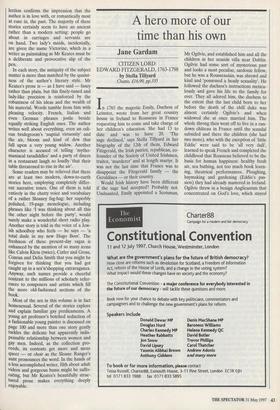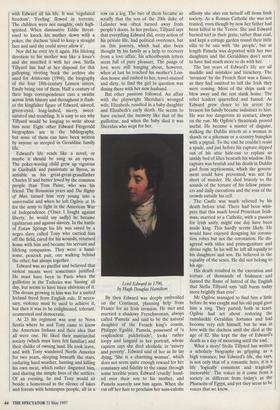A hero more of our time than his own
Jane Gardam
CITIZEN LORD: EDWARD FITZGERALD, 1763-1798
by Stella Tillyard Chatto, f16.99, pp.335 In 1765 the majestic Emily, Duchess of Leinster, wrote from her great country house in Ireland to Rousseau in France requesting him to come and take charge of her children's education. She had 13 to date and was to have 20. 'The sage declined,' says Stella Tillyard in her biography of the 12th of them, Edward Fitzgerald, the Irish patriot, republican, co- founder of the Society of United Irishmen, traitor, 'murderer' and at length martyr. It was not the last time that France was to disappoint the Fitzgerald family — the Geraldines — or their country.
Would Irish history have been different if the sage had accepted? Probably not. Undaunted, Emily appointed a Scotsman, Mr Ogilvie, and established him and all the children in her seaside villa near Dublin. Ogilvie had some sort of mysterious past and looks a most peculiar, sardonic fellow, but he was a Rousseauian, was shrewd and kind and 'possessed a heady sexuality'. He followed the duchess's instructions meticu- lously and gave his life to the family for ever. They all adored him, the duchess to the extent that the last child born to her before the death of the chill duke was almost certainly Ogilvie's and when widowed she at once married him. The whole throng then went off to live in a run- down château in France until the scandal subsided and there the children (she had two more), who with the exception of 'little Eddie' were said to be 'all very dull', learned to speak French and completed the childhood that Rousseau believed to be the basis for human happiness: healthy fresh air, sea bathing, not too much book learn- ing, theatrical performances. Ploughing, haymaking and gardening (Eddie's pas- sion) they had already mastered in Ireland. Ogilvie threw in a benign Anglicanism that concentrated on God's love, which stayed with Edward all his life. It was 'regulated freedom'. 'Feeling' flowed in torrents. The children were not naughty, only high- spirited. When diminutive Eddie threat- ened to knock his mother down with a poker, the duchess 'tried to keep a straight face and said she could never allow it'.
Nor did he ever try it again. His lifelong devotion to his mother was like a lover's and she matched it with her own. Stella Tillyard has had at her disposal for this galloping, riveting book the archive she used for Aristocrats (1994), the biography of the four 18th-century Lennox sisters, Emily being one of them. Half a century of their huge correspondence cuts a swathe across Irish history and throughout it flash- es the kingfisher figure of Edward, adored, green-eyed, long-lashed, merry, sweet- natured and troubling. It is easy to see why Tillyard would be longing to write about him next. Eight other Edward Fitzgerald biographies are in the bibliography, but none of them can have been written by anyone so steeped in Geraldine family life.
Edward's life reads like a novel, or maybe it should be sung as an opera. The poker-waving child grew up vigorous as Garibaldi and passionate as Byron, as amiable as his great-great-grandfather Charles II and better loved by the common people than Tom Paine, who was his friend. The Rousseau years and The Rights of Man turned him very young into a universalist and when he left Ogilvie at 16 for the army to fight in the American War of Independence (`Once I fought against liberty,' he would say sadly) he became egalitarian and against slavery. In the battle of Eutaw Springs his life was saved by a negro slave called Tony who carried him off the field, cared for his wounds, returned home with him and became his servant and lifelong companion. They were a hand- some, peacock pair, one walking behind the other, but always together.
Edward was no pacifist and believed that violent means were sometimes justified. He must have been in Paris when the guillotine in the Tuileries was `hissing' all day, but seems to have been oblivious of it. The dream growing in him was for a united Ireland freed from English rule. If neces- sary, violence must be used to achieve it, but then it was to be enlightened, tolerant, ecumenical and democratic.
At 23 his regiment was sent to Nova Scotia where he and Tony came to know the American Indians and their idea that all were one. He liked their matriarchal society (which must have felt familiar) and their dislike of owning land. He took leave, and with Tony wandered North America for two years, sleeping beneath the stars, enduring hard weather, hunting and killing his own meat, which rather disgusted him, and sharing the simple lives of the settlers. Of an evening, he and Tony would sit beside a homestead in the silence of lakes and forests with homespun people, all in a row on a log. The two of them became so scruffy that the son of the 20th duke of Leinster was often turned away from people's doors. In her preface, Tillyard says that everything Edward did, every action of his private life, had political overtones, but on this journey, which had also been thought by his family as a help to recovery from a love affair, his schoolboyish letters seem full of pure pleasure. The pangs of love were still hanging about, however, when at last he reached his mother's Lon- don house and rushed to her, travel-stained and dirty, to fmd the girl in question was dining there with her new husband.
But other passions followed. An affair with the playwright Sheridan's wronged wife, Elizabeth, resulted in a baby daughter and Elizabeth's early death. He seems to have excised the memory like that of the guillotine, and when the baby died it was Sheridan who wept for her.
Lord Edward in 1796, by Hugh Douglas Hamilton By then Edward was deeply embroiled on the Continent, planning help from France for an Irish invasion. He met and married a shadowy Frenchwoman, always called 'Pamela' and said to be the natural daughter of the French king's cousin, Philippe Egalite. Pamela, possessed of 'a resplendent pulchritude', looks rather loopy and languid in her portrait, whose caption says she died alcoholic in 'misery and poverty'. Edward said of her as he lay dying, 'She is a charming woman', which does not seem quite enough reward for her constancy and fidelity to the cause through some terrible years. Edward 'cruelly' hand- ed over their son to his mother, and Pamela scarcely saw him again. When she cut off her hair to proclaim her sans-culotte affinity she also cut herself off from Irish society. As a Roman Catholic she was not trusted, even though by now her father had been killed in the Terror. She and Edward burned turf in their grate, rather than coal, and kept a cottage garden round their little villa to be one with 'the people', but at length Pamela was deported with her two daughters and the Geraldines don't seem to have had much more to do with her.
The last years of Edward's life are all muddle and mistakes and treachery. The `invasion' by the French fleet was a fiasco, as they had omitted to tell the Irish they were coming. Most of the ships sank or blew away and the rest slunk home. The rebel leaders quarrelled and fumed. As Edward grew closer to his arrest for treason his family became indistinct to him. He was too dangerous to contact, always on the run. Mr Ogilvie's theatricals proved useful. He became a master of disguise, walking the Dublin streets as a woman in shawls or a pikeman or a country bumpkin with a pigtail. To the end he couldn't resist a spade, and just before his capture slipped out of his attic hide-out to replant an untidy bed of lilies beneath his window. His capture was brutish and his death in Dublin gaol from septicaemia, which the govern- ment could have prevented, was not far short of murder. He died bravely to the sounds of the torture of his fellow prison- ers and daily executions and the roar of the crowds outside his cell.
The Castle was much relieved by his death before trial. There had been whis- pers that this much loved Protestant Irish- man, married to a Catholic, with a passion for Irish unity, might one day have been made king. This hardly seems likely. He would have enjoyed designing his corona- tion robes but not the coronation. He dis- agreed with titles and primogeniture and divine right. In his will he left all equally to his daughters and son. He believed in the equality of the sexes. He did not belong to his age.
His death resulted in the execution and torture of thousands of Irishmen and fanned the flame of hatred of the English that Stella Tillyard says 'still burns today more brightly than ever'.
Mr Ogilvie managed to fmd him a little before he was caught and his old pupil gave him a ring. They parted, both in tears. Ogilvie had set about restoring the ramshackle Geraldine fortunes and had become very rich himself, but he was in love with the duchess until she died at the age of 82. She kept the day of Edward's death as a day of mourning until the end.
What a story! Stella Tillyard has written a scholarly biography as gripping as a high romance, but Edward's life, she says, is not only that of a romantic hero, it is a life 'logically consistent and tragically inexorable'. The voices in it come from a society as different from today's as the Pharaohs of Egypt, and yet they seem to be voices that we know.



































































 Previous page
Previous page